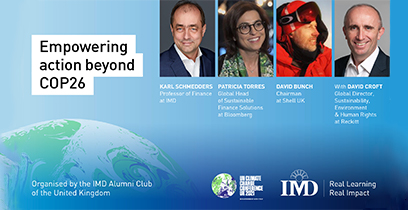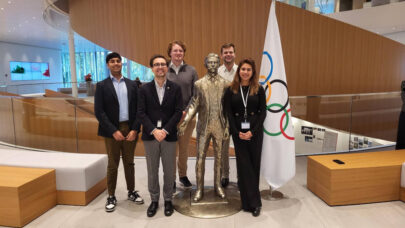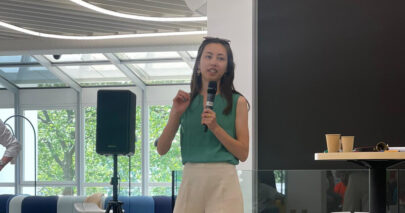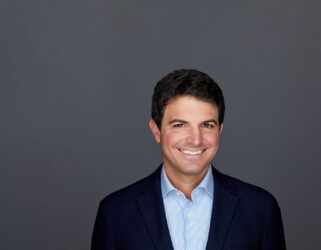
At the COP26 climate summit in Glasgow, a deal was struck to help avoid dangerous climate change. The Glasgow Climate Pact pressed for more urgent emissions cuts; existing targets put the world on course for between 2.5 and 2.7 degrees of warming by the end of the century.
Limiting warming below 1.5C is a huge undertaking that’s only possible with the help of businesses. As the dust settled on COP26, IMD’s UK alumni club gathered to discuss business strategies for addressing climate change. The panel outlined several steps to take:
Simplify ESG reporting
Business leaders must stay attuned to their impact and unintended consequences, but ESG scores are inconsistent and opaque. Investors use different evaluation standards and goals. David Bunch, Chairman Shell UK, the global energy company, called for transparency to “decode the alphabet spaghetti” of ESG reporting, and for a more clear, unified compass to guide companies. “It’s a bit of a minefield,” he said. “Clarifying that common language is really important.”
Set broader emission targets
Companies have tended to focus on direct emissions, but that is no longer enough. Patricia Torres, Global Head of Sustainable Finance Solutions at Bloomberg, the financial data group, spoke about the importance of accounting for “Scope 3”, the greenhouse gases emitted across a company’s entire value chain. “This is one of the most critical numbers,” she said, as it can help companies identify new opportunities for greater efficiencies within their value chain and should be included in net zero targets for a comprehensive view. But Scope 3 emissions are the hardest to measure.
Foster collaborative action
Torres said that responding effectively to global warming required leaders to think more globally instead of locally. She called for multilateral action, citing the way developing countries were seeking financial support from more developed countries to fund their decarbonization effort. “These countries face a huge economic impact, and they require capital to manage the transition to a low carbon economy,” she said.
Address transition risk
Karl Schmedders, Professor of Finance at IMD, echoed the need for a “just transition”, where the substantial benefits of a green economy are shared widely while supporting those who stand to lose economically. For example, he underscored the risk of “stranded assets”, investments that have already been made but can no longer earn an economic return. He said this posed a major risk to companies, workers, households, communities, regions and countries that depend on such assets.
Link executive pay to ESG goals
The professor argued that business leaders were too focused on short-term financial returns and maximizing shareholder value. He said linking executive pay to ESG goals was one way to account for the delivery of sustainable business goals. “People respond to incentives. The rest is commentary,” Schmedders said, quoting economist Steven Landsburg.
Incorporate ESG into products and services
The sentiment was echoed by David Croft, Global Director for Sustainability, Environment and Human Rights at Reckitt Benckiser, the household products group. He underscored the need for companies to fully embed ESG policies into strategy, saying: “If you link impact to the core business, you have a powerful model that engages stakeholders.”
He also stressed the importance of public-private partnerships, noting that companies, under pressure from investors and employees, had filled a void left by policymakers. “Businesses drive change faster than the policy,” said Croft.
He signed off with an optimistic remark, urging companies to focus on the upside as well as mitigating the downside risk of global warming: “The businesses who pursue the opportunities of climate change will be exceptionally well placed in 5-10 years.”


